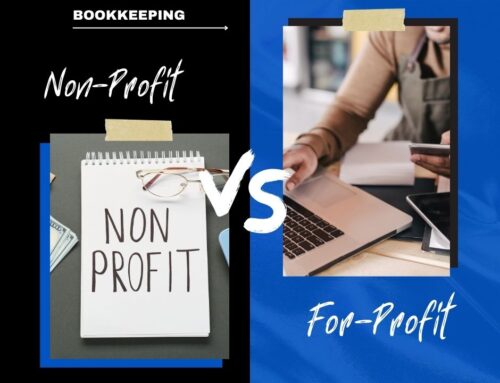There’s lots of misinformation about bookkeepers and outsourced bookkeeping services on the web. Over the years, I’ve heard just about every possible rumor and stereotype about the profession.
While some stereotypes hold some truth, most of what you hear needs to be taken with a grain of salt.
For small business owners, hiring an outsourced bookkeeping service might feel unattainable. The idea of “outsourcing” seems like it’s only reserved for large firms and big corporations, right?
If you have this mindset, it’s probably because you’ve fallen victim to the myths and misconceptions about small business bookkeeping.
Myth #1: You Can Do It Alone
Does every business need a bookkeeper on day one? Not necessarily.
When you’re first starting, you can probably get away with managing the books on your own if you’re an entrepreneur, single-member LLC, or a freelancer. But most small business owners cannot handle bookkeeping on their own.
You’ll need to bring in some professional help, whether it be an in-house hire or outsourced bookkeeping firm.
According to a recent study, 70% of small business owners don’t have a dedicated bookkeeper. This number is alarmingly high, considering how important accurate bookkeeping is to the success of a company.
There are lots of great tools for bookkeeping software on the market today. But this technology isn’t meant to replace an actual bookkeeper.
Aside from the lack of training and expertise, think about how much time you spend every day or week on bookkeeping tasks. Imagine if you could spend that time focusing on other areas of your business, like sales or growth.
2. Outsourcing is Overseas
For some reason, lots of people automatically associate the term “outsourcing” with “overseas.”
While the “outsourcing overseas” might be a common practice for manufacturers and technology companies, that’s not necessarily the case for bookkeeping.
To outsource something simply means you’re obtaining a service from a third-party source or contracting the work. A task or service can be completed by an outsourced firm, as opposed to an in-house employee.
By no means does outsourcing imply that something is done overseas. Some bookkeeping firms do use overseas bookkeepers, Navitance never does.
Your outsourced bookkeeping service can be in your own state or even have an office on the same street as you. So, at Navitance you won’t have to worry about your accounting records being sent to another country. You can pick up the phone and speak to your outsourced bookkeeper without having to worry about time zones or international calling fees.
3. Bookkeeping is Expensive
Bookkeeping can be expensive. But it doesn’t have to be.
A bookkeeper is only expensive if you’re hiring an in-house employee. In this case, you’ll have to pay for expenses like:
- Salary
- Benefits
- Payroll
- Taxes
- Training costs
- Sick days
- Vacation time
These costs add up quickly for small business owners. But with an outsourced bookkeeper, you won’t have to worry about any of this.
You’ll only pay for the agreed services, and not a penny more. There won’t be a lengthy recruiting, hiring and onboarding process. An outsourced bookkeeping firm doesn’t take sick time or go on vacation.
Outsourcing your bookkeeping needs is significantly more cost-effective than keeping things in-house.
4. It’s Only Data Entry
Bookkeeping is much more than just data entry.
Yes, it does require a considerable amount of data input and similar tasks. But that’s just one of the many components of a bookkeeper’s job. Typical responsibilities for bookkeepers include:
- Reconcile bank accounts
- Manage accounts payables
- Manage receivables
- Prepare financial reports
- Record all financial transactions
- Payroll
- Initially prepare the books for taxes
While the role will vary slightly for each business, a bookkeeper has a wide range of tasks to complete that go far and beyond entering data into a computer. Your bookkeeper will help you avoid common bookkeeping mistakes you might be making.
5. Lack of Control
The idea of relinquishing control of a business department can be a scary thought for entrepreneurs and small business owners.
However, hiring an outsourced bookkeeper does not mean that you’re losing control over anything. It simply means that someone else is going to be handling specific tasks. You still have total control over your financial records, accounting department, and business.
Here’s a simple analogy. Let’s say you own a brick and mortar retail business.
You hire a cashier to work at the register. Did you lose control over your storefront? Absolutely not. All you did was delegate an operational task to someone else.
Working with an outsourced bookkeeper is the same thing. The only difference is that the bookkeeping firm you hire isn’t an employee. You still remain in control.
6. You Only Need a Bookkeeper During Tax Season
A bookkeeper does not file your taxes.
While a bookkeeper plays a crucial role in closing the books and preparing financials for your accountant during tax time, a bookkeeper is not a seasonal position.
For tax preparation to go smoothly, a bookkeeper needs to be managing the books all year.
Imagine how difficult it would be to find a single mis-recorded transaction buried among thousands for the year. It could take days or weeks to get your books in order if you hire a bookkeeper in March with the sole intention of tax preparation.
While a bookkeeper will undoubtedly be useful during tax season, it’s still a year-round responsibility.
7. Lack of Security
Due to the sensitive nature of a company’s financial records, it’s natural for business owners to have second thoughts or reservations about turning that information over to someone else.
To be clear, no data anywhere will ever be 100% safe in today’s day and age.
However, outsourced bookkeeping services always use the latest and most up-to-date technology. You’re much more likely to have a security breach in your own home or office than you would with a qualified outsourced bookkeeper.
Outsourced bookkeeping firms put security at the top of their priority list. If you still have some questions or concerns about this subject, review our guide on.
Conclusion
Lots of the negative things you’ve heard about bookkeeping services probably aren’t true.
Is it possible that a friend or colleague had a bad experience with a specific firm? Of course. But that doesn’t mean that all bookkeepers are bad.
As you can see from this guide, most of what you’ve heard about bookkeeping is just a common misconception.
Now that these bookkeeping myths have been debunked, it’s time for your business to find an outsourced bookkeeper who can assist with your needs. Contact us here at Navitance for a free consultation.





